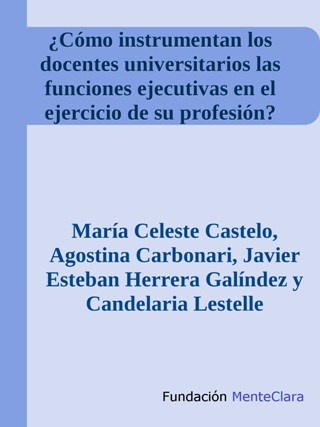How do university teachers instrument the executive finctions in the exercise of their profession?
Abstract
This research project corresponds to a descriptive study that aims to specify the use of executive functions in teachers of the careers of Business Administration, Agrarian Administration and Advocacy at the Universidad Siglo 21 at the headquarters of Río Cuarto. The population was made up of all the teachers of the aforementioned careers, whose sample was selected through accidental non-probability sampling. To evaluate executive functions, the self-administered questionnaire "Jordan Executive Function Index", previously suitable for this purpose, was used as an instrument; evaluating attention, inhibition and organization. In this instance, it seeks to reach conclusions on the data collected that will allow, in the future, to design an interactive audiovisual material with multiple strategies that can be implemented by the university in teacher training. They will have the purpose of promoting the use of these functions, thus improving teaching performance and, therefore, positively influencing the education provided by the local university.References
Barceló Martínez, E., Lewis Harb, S. y Moreno Torres, M. (2011). Funciones Ejecutivas en Estudiantes Universitarios que presentan bajo y alto rendimiento académico. Revista Nº 18. Psicología desde el Caribe. Universidad del Norte.
Climent- Martinez, G., Luna- Lario, P., Bombín- González, I., Cifuentes- Rodriguez, A., Tirapu- Ustárroz, J. y Díaz- Orueta, U. (2014). Evaluación Neuropsicológica de las funciones ejecutivas mediante realidade virtual. Revista Neurológica Nº 58. Recuperado de: https://www.psyciencia.com/wp-content/uploads/2014/06/Evaluacion-Funciones-Ejecutivas-A-Trav%C3%83%C2%A9s-de-Realidad-Virtual.pdf
García, A., Enseñat, A., Ustárroz, J., Rovira, T. (2009). Maduración de la Corteza Prefrontal y Desarrollo de las Funciones Ejecutivas Durante los Primeros Cinco Años de Vida. Revista de Neurología N° 48, Supl. 8. (pp. 435-440).
Hernández Sampieri, R., Fernández Collado, C. y Baptista Lucio, M. P. (2010). Metodología de la investigación. Recuperado de: https://www.esup.edu.pe/descargas/dep_investigacion/Metodologia%20de%20la%20investigaci%C3%B3n%205ta%20Edici%C3%B3n.pdf
León-Carrión, J. y Barroso, J. M. (1997). Neuropsicología del pensamiento. Control ejecutivo y lóbulo frontal. Kronos: Sevilla.
Luria, A. R. (1979). El cerebro en acción. 2ª ed., Barcelona: Fontanella.
Rains, D. (2004). Principios de Neuropsicología Humana. México. Ed. McGraw-Hill.
Ruiz Limón, R. (2007). Historia y Evolución del Pensamiento Científico. Recuperado de: http://www.eumed.net/libros-gratis/2007a/257/index.htm
Sánchez Carpintero, R. y Narbona, J. (2001). Revisión Conceptual del Sistema Ejecutivo y su Estudio en el Niño con Trastorno por Déficit de Atención e Hiperactividad. Revista de Neurología N° 33, Supl. 1. (pp. 47-53).
Soprano, M. (2009). Cómo Evaluar la Atención y las Funciones Ejecutivas en Niños y Adolescentes. Bs. As. Ed. Paidós.
Stelzer, F. y Cervigni, M. A. (2011). Desempeño académico y funciones ejecutivas en infancia y adolescencia: una revisión de la literatura. Instituto Rosario de Investigación en Ciencias de la Educación (IRICE-CONICET/UNR).
Stuss, K. H. y Benson, D. F. (1984). Neuropsychological studies of the frontal lobes. Psychological Bulletin. Revista Nº 95. (pp. 3-28).
Travaglia, P., Lestelle, C., Rigo, D., Alaminos, C., Meneghello, A., Lorenzoni, M. J., Cervella, S., Castelo, M. C. (2015). Hábitos de estudio y funciones ejecutivas en estudiantes universitarios. Universidad Siglo 21: Argentina.
Travaglia, P., Lestelle, C., Alaminos, C., Cervella, S., Castelo, M. C. (2017). Aprendizaje en la Universidad: ¿Cuáles son los hábitos de estudio que predominan? Universidad Siglo 21: Argentina.
Travaglia, P., Lestelle, C., Alaminos, C., Cervella, S., Castelo, M. C. (2018). La Neuropsicoeducación en la formación docente. Universidad Siglo 21: Argentina.
Vasilachis de Gialdino, I. (1992). Métodos Cualitativos I. Los problemas teórico-epistemológicos. Buenos Aires, Centro Editor de América Latina.
Welsh, H. H., Lind, A. J. y Waters, D. L. (1991). Monitoring Frogs and Toads on Region 5 National Forests. As FHR Currents 4. US Forest Service, Region 5. Eureka, CA. (pp. 12).
Willis, D. y Mateer, C. (1992). Development al impact of frontal lobe injury in kiddle childhood. Special issue: the role of frontal lobe in maturation in cognitive and social development. Brain and Cognition, 20 (1). (pp. 196-204).
Estadísticas de lectura: 1885
Descargas: PDF (ESPAÑOL (ARGENTINA)) 567 - HTML (ESPAÑOL (ARGENTINA)) 476 - XML (ESPAÑOL (ARGENTINA)) 372 - EPUB (ESPAÑOL (ARGENTINA)) 370
Copyright (c) 2020 MenteClara Foundation's Peer-reviewed Journal

This work is licensed under a Creative Commons Attribution 4.0 International License.
Authors who publish in this journal agree with the following terms:
a. Authors publish under a Creative Commons Acknowledgment 4.0 International license that allows others to share the work with an authorship acknowledgment of the work and the initial publication in this journal.
b. Authors, who retain their rights after publication, are allowed and encouraged to disseminate their work electronically (for example, in institutional repositories or on their own website) before and during the submission process, as it may result in productive exchanges as well as earlier and greater citations of published works (See The Effect of Open Access).
 Since November 1st, 2018, all articles published in this journal are available under a Creative Commons Acknowledgment 4.0 International license.
Since November 1st, 2018, all articles published in this journal are available under a Creative Commons Acknowledgment 4.0 International license.

